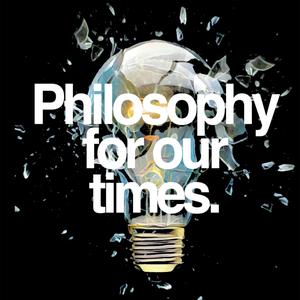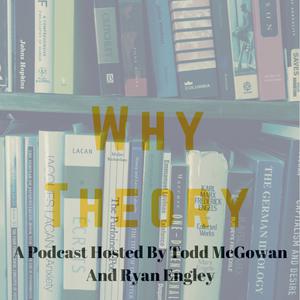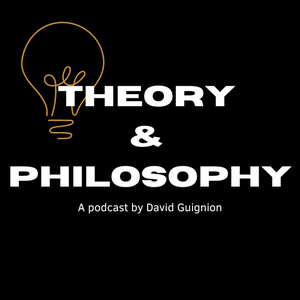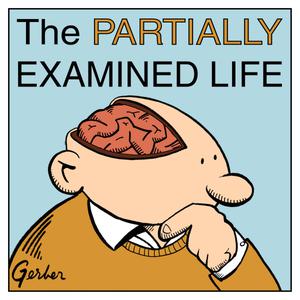
New Books in Philosophy
Interviews with Philosophers about their New Books
- 1 hour 12 minutesJohn D. Norton, "The Large-Scale Structure of Inductive Inference" (U Calgary Press, 2024)
This book is free to download here.
Science depends essentially on inductive inferences – inferences that go beyond the evidence on which they are based. But inductive inferences have historically been modeled on deductive inferences, which are valid if and only if they satisfy a valid argument form.
In The Large-Scale Structure of Inductive Inference (BSPS Open/University of Calgary Press), John Norton expands his defense of what he calls the material theory of induction: what makes an induction good is not its conforming to a universal rule, like deduction, but instead by its being warranted by true background facts in a particular domain. Norton – Distinguished Professor of philosophy of science at the University of Pittsburgh -- argues that while these facts are themselves in turn supported by inductive inferences, the resulting network of inductive support does not suffer from vicious circularity, is not a form of coherentist epistemology, and dissolves the infamous problem of induction articulated most clearly by Hume.
Learn more about your ad choices. Visit megaphone.fm/adchoices
Support our show by becoming a premium member! https://newbooksnetwork.supportingcast.fm/philosophy
11 January 2025, 9:00 am - 1 hour 10 minutesMichael Fuerstein, "Experiments in Living Together: How Democracy Drives Social Progress" (Oxford UP, 2024)
Various kind of philosophical considerations have been offered in favor of democracy. By some accounts, democracy realizes some intrinsic value, such as equality or collective autonomy. According to other views, democracy’s value is more instrumental: it tends to produce or promote certain social goods like stability, prosperity, and peace. However, a longstanding alternative tradition locates democracy’s value in its capacity to make social and moral progress. Here, the idea isn’t so much that democracy produces an already-identified social good, but rather that democracy fosters a kind of social and moral discovery.
In Experiments in Living Together: How Democracy Drives Social Progress (Oxford UP, 2024), Michael Fuerstein draws on normative and empirical considerations in proposing a systematic account of democracy’s capacity to foster progress.
Learn more about your ad choices. Visit megaphone.fm/adchoices
Support our show by becoming a premium member! https://newbooksnetwork.supportingcast.fm/philosophy
1 January 2025, 9:00 am - 1 hour 6 minutesEge Selin Islekel, "Nightmare Remains: The Politics of Mourning and Epistemologies of Disappearance" (Northwestern UP, 2024)
What does mourning have to do with politics? How do practices of forced disappearance and improper burial shape subjects, spaces, and what is intelligible? What are people doing in movements across the globe when they gather in public space and recount nightmares of their disappeared loved ones?
In Nightmare Remains: The Politics of Mourning and Epistemologies of Disappearance (Northwestern University Press, 2024), Ege Selin Islekel creates a South-South dialogue, connecting practices of forced disappearance in Latin America with those in Turkey and the movements of resistance developed by the searchers and remnants. By analyzing methods of power that target death and the afterlives of the dead, Islekel shows that the world is, but need not be, organized by such practices. She shows how people mobilize resistance within the death worlds of necrosovereignty, inventing possibilities from the very stuff of nightmares.
Learn more about your ad choices. Visit megaphone.fm/adchoices
Support our show by becoming a premium member! https://newbooksnetwork.supportingcast.fm/philosophy
20 December 2024, 9:00 am - 1 hour 12 minutesAndrea Scarantino, "Emotion Theory: The Routledge Comprehensive Guide" (Routledge, 2024)
This interview is an exception to our “single author monographs” rule, because the edited collection that is its topic is an intellectual achievement worth making an exception for in over 12 years of New Books in Philosophy podcasts. Emotion Theory: The Routledge Comprehensive Guide: Volume I and Volume II (Routledge, 2024) is a two-volume compendium of 62 chapters on emotion theory written by 101 leading theorists from philosophy, psychology, biology, sociology, neuroscience, and other fields, all grappling with the question: What is an emotion? Editor Andrea Scarantino, who is a professor of philosophy at George State University, has compiled a synoptic and thematically organized collection that covers the history of emotion theory, the main contemporary theories of emotions, individual chapters on 35 distinct emotions, and more. The volumes bring together theorists from distinct disciplines that don’t normally engage with each others’ work, and provide readers with a one-stop-shop for clearly written introductions to the current states of play in emotion research.
Andrea Scarantino is Professor of Philosophy at Georgia State University, where he has taught since 2005.
Carrie Figdor is professor of philosophy at the University of Iowa.
Learn more about your ad choices. Visit megaphone.fm/adchoices
Support our show by becoming a premium member! https://newbooksnetwork.supportingcast.fm/philosophy
10 December 2024, 9:00 am - 1 hour 9 minutesAlexander Guerrero, "Lottocracy: Democracy Without Elections" (Oxford UP, 2024)
Elections loom large in our everyday understanding of democracy. Yet we also acknowledge that our familiar electoral apparatus is questionable from a democratic point of view. Very few citizens have access to the kinds of resources that could enable them to stand for election; consequently, political candidates (thus officeholders) tend to come from elite social backgrounds. Moreover, elections involve campaigns, and campaigns almost always deploy various persuasion techniques, many of which are deceptive, manipulative, and downright toxic. Once elected, officials begin seeking re-election, which means that they must devote a great deal of attention to potential donors to their re-election campaigns. And on it goes. If by “democracy” one means “rule by the people,” it’s difficult to see how contemporary electoral practices empower us.
Notably, our fixation with elections as the sine qua non of democracy is relatively recent. Aristotle claimed that elections are fundamentally oligarchic, and that lotteries were a truly democratic way of filling public offices. In Lottocracy: Democracy without Elections (Oxford University Press, 2024), Alex Guerrero proposes a non-electoral version of democracy that relies on “single issue legislatures” composed of citizens chosen by lot.
Learn more about your ad choices. Visit megaphone.fm/adchoices
Support our show by becoming a premium member! https://newbooksnetwork.supportingcast.fm/philosophy
4 December 2024, 9:00 am - 1 hour 37 minutesRobert B. Talisse, "Civic Solitude: Why Democracy Needs Distance" (Oxford UP, 2024)
An internet search of the phrase "this is what democracy looks like" returns thousands of images of people assembled in public for the purpose of collective action. But is group collaboration truly the defining feature of effective democracy?
In Civic Solitude: Why Democracy Needs Distance (Oxford UP, 2024), Robert B. Talisse suggests that while group action is essential to democracy, action without reflection can present insidious challenges, as individuals' perspectives can be distorted by group dynamics. The culprit is a cognitive dynamic called belief polarization. As we interact with our political allies, we are exposed to forces that render us more radical in our beliefs and increasingly hostile to those who do not share them. What's more, the social environments we inhabit in our day-to-day lives are sorted along partisan lines. We are surrounded by triggers of political extremity and animosity. Thus, our ordinary activities encourage the attitude that democracy is possible only when everyone agrees--a profoundly antidemocratic stance.
Drawing on extensive research about polarization and partisanship, Talisse argues that certain core democratic capacities can be cultivated only at a distance from the political fray. If we are to meet the responsibilities of democratic citizenship, we must occasionally step away from our allies and opponents alike. We can perform this self-work only in secluded settings where we can engage in civic reflection that is not prepackaged in the idiom of our political divides, allowing us to contemplate political circumstances that are not our own.
Learn more about your ad choices. Visit megaphone.fm/adchoices
Support our show by becoming a premium member! https://newbooksnetwork.supportingcast.fm/philosophy
21 November 2024, 9:00 am - 1 hour 1 minuteOwen Ware, "Indian Philosophy and Yoga in Germany" (Routledge, 2023)
Indian Philosophy and Yoga in Germany by Owen Ware (Routledge, 2024) takes the reader on a tour through the reception of Yoga philosophies in nineteenth-century German and the early twentieth century. European luminaries like Schlegel, Hegel, von Günderrode, Schelling, Humbolt, and Müller all engaged with works like the Bhagavad Gītā and Yogā Sūtras, though in very different ways, some reading yogic thought as entailing a threatening nihilism, others lauding it as superlatively philosophical. Ware shows how their responses to Indian thought illuminates our understanding of post-Kantian philosophy and its anxieties over pantheism indebted to Spinoza. He concludes with two chapters on a range of Indian scholars from Swami Vivekananda to K. C. Bhattacharyya, exploring how their work engages with this history of European readings, grappling with themes of freedom, morality, and devotion in yoga.
Learn more about your ad choices. Visit megaphone.fm/adchoices
Support our show by becoming a premium member! https://newbooksnetwork.supportingcast.fm/philosophy
20 November 2024, 9:00 am - 1 hour 5 minutesMatti Eklund, "Alien Structure: Language and Reality" (Oxford UP, 2024)
It is not uncommon to encounter people who think and talk about the world so differently from the way you do that it’s not really possible to put yourself in their shoes. But such systems of representing the world are not truly alien – they still involve terms that pick out objects, properties, and other elements found in familiar languages and metaphysical theories.
In Alien Structure: Language and Reality (Oxford University Press, 2024)), Matti Eklund considers whether there are ways of representing the world that are completely alien in both linguistic and metaphysical structure, and which may capture reality better (on an ontological realist view) or which might show the limits to “anything goes” (on an ontological relativist view). Eklund, who is professor of philosophy at Uppsala University, defends the value of considering these possibilities and links his discussion to conceptual engineering, philosophy of quantum mechanics, and other contemporary philosophical debates.
Learn more about your ad choices. Visit megaphone.fm/adchoices
Support our show by becoming a premium member! https://newbooksnetwork.supportingcast.fm/philosophy
10 November 2024, 9:00 am - 1 hour 11 secondsVanessa Christina Wills, "Marx's Ethical Vision" (Oxford UP, 2024)
Does Marx have a coherent ethical vision? How does that square with his sometimes-scathing dismissal of morality? What does his critique of capital have to do with ethics? Why is the proletariat the revolutionary class? What is the normative importance of that claim?
In Marx’s Ethical Vision (Oxford University Press, 2024), Vanessa Wills provides a careful reconstruction of Marx’s understanding of human nature and the possibility of creating a world best suited to our flourishing. Working from Marx’s earliest texts through his last, Wills shows not only how Marx builds his understanding from material conditions in their historical specificity, but also how doing so can help guide efforts to change the world in ways that support individual growth, self-expression, and development as a universally shared project. Wills consistently argues against philosophical projects that try to salvage Marx’s valuable insights stripped of his method. Wills shows that the method by which Marx sought to understand the world and human nature as a force within it is integral to understanding his vision for what ought to be.
Learn more about your ad choices. Visit megaphone.fm/adchoices
Support our show by becoming a premium member! https://newbooksnetwork.supportingcast.fm/philosophy
21 October 2024, 8:00 am - 1 hour 7 minutesRoberta L. Millstein, "The Land Is Our Community: Aldo Leopold’s Environmental Ethic for the New Millennium" (U Chicago Press, 2024)
Aldo Leopold’s Land Ethic has been both hugely influential in the environmental conservation movement – and also often misinterpreted. In The Land is Our Community: Aldo Leopold’s Environmental Ethic for the New Millenium (University of Chicago Press), Roberta Millstein aims to set the record straight. Millstein, who is professor emerit of philosophy at the University of California – Davis, offers interpretations of Leopold’s key concepts of the “land community” based in complex webs of causal interactions and “land health” as an ability of the land community to renew itself over time. She provides a comprehensive overview of Leopold’s prescient ideas regarding the expansion of humanity’s scope of moral concern to the land communities to which we belong.
Learn more about your ad choices. Visit megaphone.fm/adchoices
Support our show by becoming a premium member! https://newbooksnetwork.supportingcast.fm/philosophy
10 October 2024, 8:00 am - 1 hour 7 minutesSamuel Ely Bagg, "The Dispersion of Power: A Critical Realist Theory of Democracy" (Oxford UP, 2023)
We commonly think of democracy as a social order governed by the people’s collective will. Given the size of the modern states, this picture is typically adjusted to say that democracy is a system of representative government, where elected officials are tasked with governing in ways that reflect the collective will of their constituents.
Although it is familiar, this way of depicting democracy invites difficulties. The concept of a collective will is notoriously difficult to nail down. And, moreover, the idea that modern elections reveal or express such a will remains dubious. Accordingly, a good deal of democratic theory aims to fill in the missing details regarding the collective will and its representation.
In The Dispersion of Power: A Critical Realist Theory of Democracy (Oxford University Press 2024), Samuel Bagg takes a different tack by proposing a vision of democracy where the central aim is to protect public power from capture.
Learn more about your ad choices. Visit megaphone.fm/adchoices
Support our show by becoming a premium member! https://newbooksnetwork.supportingcast.fm/philosophy
1 October 2024, 8:00 am - More Episodes? Get the App
Your feedback is valuable to us. Should you encounter any bugs, glitches, lack of functionality or other problems, please email us on [email protected] or join Moon.FM Telegram Group where you can talk directly to the dev team who are happy to answer any queries.
 Philosophy For Our Times
Philosophy For Our Times
 Why Theory
Why Theory
 Theory & Philosophy
Theory & Philosophy
 The Partially Examined Life Philosophy Podcast
The Partially Examined Life Philosophy Podcast
 History of Philosophy Without Any Gaps
History of Philosophy Without Any Gaps
 New Books in Critical Theory
New Books in Critical Theory